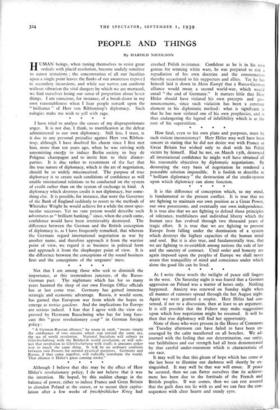I have tried to analyse the causes of my disproportionate
anger. It is not due, I think, to mortification at the defeat administered to our own diplomacy. Still less, I trust, is it due to any personal prejudice against Herr von Ribben- trop, although I have doubted his charm since I first met him, more than ten years ago, when he was striving with unremitting energy to induce Berlin society to buy de Polignac champagne and to invite him to their dinner- parties. It is due rather to resentment of the fact that the true nature of diplomacy, which is the art of negotiation, should be so widely misconceived. The purpose of true diplomacy is to create such conditions of confidence as will enable international relations to be conducted on the system of credit rather than on the system of exchange in kind. A diplomacy which destroys credit is not diplomacy, but some- thing else. It is possible, for instance, that were the Governor of the Bank of England suddenly to resort to the methods of Whittaker Wright he would achieve for a while the most spec- tacular successes. Yet no sane person would describe such adventures as " brilliant banking," since, when the crash came, confidence would have been irretrievably destroyed. The difference between the German and the British conception of diplomacy is, as I have frequently remarked, that whereas the Germans regard international negotiation as war by another name, and therefore approach it from the warrior point of view, we regard it as business in political form and approach it from the shopkeeper point of view. It is the difference between the conceptions of the sound business firm and the conceptions of the sergeants' mess.
* *


































 Previous page
Previous page